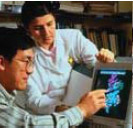- President John F. Kennedy

In answering President John F. Kennedy's bold call to put a man on the moon, America unleashed unprecedented technological advances that built the world's most vibrant economy. The talent, intellect, and entrepreneurial spirit of the American people that made this nation the leader is being seriously challenged by other countries. Americans must continue to innovate in order to create new thriving industries that will produce millions of good jobs here at home and a better future for the next generation.
In 2005, House Democrats, working with leaders from the academic, high-technology, biotech, venture capital, and telecommunications sectors, as well as with students and young entrepreneurs, launched the Innovation Agenda, a Commitment to Competitiveness. The 110th Congress is taking America in a New Direction, to help ensure our nation’s global economic competitiveness for generations to come—through a new emphasis on math, science, engineering, and technology education, and a renewed commitment to basic research. Our future prosperity demands that we initiate this sustained financial and intellectual investment in innovation. Our competitiveness in a global economy also relies on ensuring that our children and grandchildren are not burdened by failed fiscal policies that have exploded the national debt. That is why we submitted these priorities to the rigors of “pay-as-you-go” budgeting to ensure that new spending or tax cuts do not add to the deficit.
Read the full Innovation Agenda brochure>>
Learn more about the America COMPETES Act>>
Watch House Democrats discuss the Innovation Agenda:
In 2007- 2008, during the 110th Congress, these key measures which were part of the original Innovation Agenda have been signed into law:
 CREATING A NEW GENERATION OF INNOVATORS
CREATING A NEW GENERATION OF INNOVATORS
- Make college more affordable for all students by providing the largest college aid expansion since the GI Bill in 1944 and cutting college loan rates in half. (College Cost Reduction and Access Act, P.L. 110-84)
- Invest in 25,000 new teachers through professional development, summer training institutes, graduate education assistance, and scholarships through NSF's Noyce Teacher Scholarship Program and Math and Science Partnerships Program. (America COMPETES Act, P.L. 110-69)
- Ensure more highly qualified teachers in the classroom, in the fields of mathematics, science, engineering, technology, and critical foreign languages through grant programs that provide baccalaureate degrees in these areas with concurrent teacher certification. Create competitive grants to establish programs focused on math for elementary and secondary schools including training for teachers with a focus on serving high-needs schools. (America COMPETES Act, P.L. 110-69)
- Establish a public-private partnership with the business community and institutions of higher education to develop programs to educate and train mathematicians, scientists and engineers to meet the workforce demands of the business industry. (America COMPETES Act, P.L. 110-69)
- Expand access to Advanced Placement (AP) and International Baccalaureate (IB) classes for students and increases the number of qualified AP/IB teachers. (America COMPETES Act, P.L. 110-69)
- Enhance the ability of states to build more competitive workforces, through P-16+ Councils and other tools, to coordinate education and workforce goals with industry and community leaders, and to identify the challenges of recruiting and retaining students in innovative fields. (America COMPETES Act, P.L. 110-69)
- Broaden the participation of minorities and women in science and engineering fields at all levels, from kindergarten students to advanced researchers. (America COMPETES Act, P.L. 110-69)
 A SUSTAINED COMMITMENT TO RESEARCH & DEVELOPMENT
A SUSTAINED COMMITMENT TO RESEARCH & DEVELOPMENT
- Invest in basic research and development and put us on a path to double funding for the National Science Foundation (NSF), the National Institute of Standards and Technology (NIST), and the Department of Energy's Office of Science. (America COMPETES Act, P.L. 110-69)
- Provide grants for outstanding researches in the early stages of their careers at both NSF and the Department of Energy. (America COMPETES Act, P.L. 110-69)
- Extend the Research and Development Tax Cut to increase domestic investment and create more high-quality American jobs for two years. (Economic Rescue Plan, P.L. 110-343)
- Coordinate and prioritize research infrastructure needs at universities and national labs, strengthen planning and coordination for interagency research and development in information technology including deployment of high performance computers for use by the research community, and establish a Presidential innovation award. (America COMPETES Act, P.L. 110-69)
 AFFORDABLE BROADBAND ACCESS FOR ALL AMERICANS
AFFORDABLE BROADBAND ACCESS FOR ALL AMERICANS
- Ensure greater accountability for broadband services by updating the methodology that the Federal Communications Commission uses to measure broadband deployment and requiring better data collection from providers, an international comparison, and consumer surveys to report on broadband speeds and prices. (Broadband Data Improvement Act, P.L. 110-385)
- Provide grants to help local community leaders and stakeholders identify and aggregate demand for broadband in unserved and underserved communities. (Broadband Data Improvement Act, P.L. 110-385)
- Develop broadband access maps in partnership with state governments and provide grants to states entities for such efforts. By knowing where broadband is deployed, we can better target federal resources to deploy broadband in our rural and underserved communities. (Broadband Data Improvement Act, P.L. 110-385)
- Expand access to broadband in rural communities by ensuring that the Rural Utilities Service broadband initiatives effectively target underserved areas in rural America and account for the unique obstacles faced by broadband providers in rural regions of the country. (Farm Bill, P.L. 110-234)
 DECLARING ENERGY INDEPENDENCE
DECLARING ENERGY INDEPENDENCE
- Create a new Advanced Research Projects Agency for Energy (ARPA-E) to help provide talent and resources for high-risk, high-reward clean energy research and technology development, and help attract investment for the next generation of revolutionary technologies. (America COMPETES Act, P.L. 110-69)
- Reduce our dependence on foreign oil. Expand production and distribution of clean domestically-produced biofuels to 36 billion gallons in 2022, with an emphasis on cellulosic ethanol. Slash U.S. oil consumption by 4 million barrels per day by 2030 through an increase in vehicle fuel efficiency standards to 35 miles per gallon in 2020 - the first such increase in 32 years. (Energy Independence and Security Act of 2007, P.L. 110-140)
- Expand and extend renewable energy incentives to spur the development and adoption of new energy technologies and to signal that there is a market that will support them. (Economic Rescue Plan, P.L. 110-343)
- Enhance technology-driven energy efficiency. Save energy to help consumers and businesses cope with high energy bills, reduce greenhouse gas emissions to protect the health of our planet, and strengthen our economy by generating American jobs and capital investment. (Energy Independence and Security Act of 2007, P.L. 110-140)
 SMALL BUSINESS TOOLS FOR INNOVATION
SMALL BUSINESS TOOLS FOR INNOVATION
- Spur new manufacturing processes and techniques by putting funding for the Manufacturing Extension Partnership (MEP) on a path to doubling over 10 years. The partnership also leverages federal, state, and private dollars. (America COMPETES Act, P.L. 110-69)
- Support high-risk, high-reward, pre-competitive technology development, with high potential for public benefit, with a new initiative, the Technology Innovation Program (TIP), to focus on small and medium-sized companies. (America COMPETES Act, P.L. 110-69)


